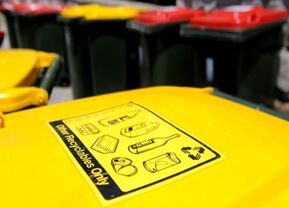墨尔本一学校取消垃圾桶
|
Melbourne Girls' College is getting rid of all its bins and asking students to take their rubbish home in a bold bid to encourage them to move towards zero waste. Starting next Monday, the Richmond college will over five weeks phase out receptacles in classrooms and the yard, leaving 1400 students and 140 staff to find their own home for chip packets and juice boxes. Even the school's 20 recycling bins will be removed, because the collapse of SKM Recycling means the college's plastic and glass recycling is now sent to landfill. Paper can still be recycled via the school, because recycling for that is still operating.
As part of the shift, volunteer students will conduct daily non-compulsory food inspections in which children bringing "zero waste" lunch boxes will be rewarded. Students using only reusable packaging will receive a token that will go into a draw to win prizes such as keep cups. Yes, the rubbish that students take home may still go to landfill via their home bins, but teacher Paula McIntosh says the new policy will help persuade families to buy fewer packaged items and reuse containers. She said the campaigning of Swedish teenage climate activist Greta Thunberg had inspired the school, showing that the acts of one person "can lead to enormous change". Student environment leader Lucy Skelton, 17, says most issues around carrying rubbish home, such as smell and mess, can be solved. Uneaten tuna in a tin, for example, can go into the school's compost bin and the tin can be washed before it's taken home. Ms McIntosh acknowledges that some parents may not have the time or means to avoid food in single-use packaging, "but it's trying to get as many people as we can to avoid it". She says she got the no-bins idea from national park guidelines, which ask visitors to take rubbish home with them. School sustainability co-ordinator Andrew Vance says his marine biology students were horrified when they used a microscope to discover micro plastics in Port Phillip Bay water. "It was shocking," Mr Vance says. "We felt, 'Oh my gosh, what can we do about this problem?' " "And if you expose students to these problems, if you then don't give them an opportunity to try and be involved in the solution, that's when it leads to depression and anxiety and ecological grief." Says principal Karen Money: "We talk a lot, as educators, about the wicked problems the world faces, and if we don't start putting some actions behind that rhetoric, then it's just empty." |









